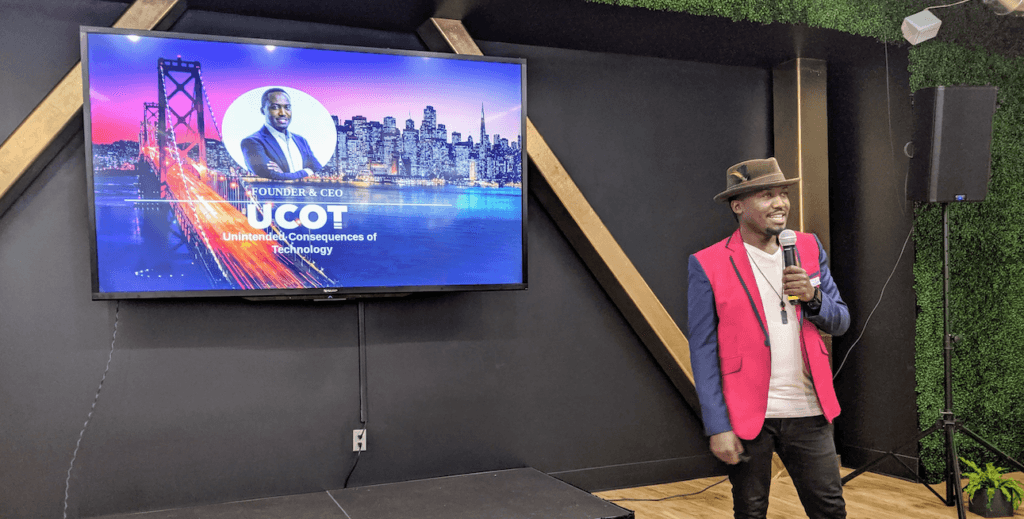By Brett Wilkins
Unintended Consequences of Technology (UCOT) founder and CEO Christopher Ategeka was a featured speaker at the All Tech Is Human conference at ThoughtWorks San Francisco on Saturday, September 21. The topic at hand was how to better regulate tech companies.
“Tech companies have become so big, bigger than some countries, and it’s so hard to regulate them,” said Ategeka at the start of his speech. “I’m not a regulator and I’m not going to give prescriptions… but I can show you where the power lies and how we can work together to come up with some regulatory policies that make sense.”
Take Facebook. If it were a country it would have a population of around 2.4 billion, or nearly as many people as the world’s two most populous nations, China and India, combined. It would be a global superpower with power and influence surpassed by very few actual countries, except that instead of “citizens” it has “users.” The company is so powerful that there’s no single regulatory body that can force it to do much of anything. Last year, lawmakers in Britain and other nations blasted Facebook co-founder and CEO Mark Zuckerberg after he was a no-show at an important parliamentary hearing on the Cambridge Analytica scandal and the role of social media companies in disseminating disinformation and “fake news.” The UK Digital, Culture, Media and Sport Committee famously tweeted a photo of Zuckerberg’s empty chair at the hearing.
In fairness, Zuckerberg’s disdain for regulators isn’t completely unwarranted. “We have regulators who don’t actually understand what they need to regulate,” said Ategeka, referring to some of the more cringe-worthy congressional hearings at which lawmakers asked questions that belied their dearth of basic tech knowledge and “that would make you and I roll our eyes.” Regulators also often don’t understand the tech culture of disruption and “breaking things.”
“We can’t use the old analog way of governing to police our new digital system,” asserted Ategeka.
How do we get regulators to listen and learn? Ategeka, who is fond of acronyms, has one that fits the occasion — SECs. That stands for shareholders, employees and consumers. Shareholders wield enormous power over companies. Employees also have a lot of power, “and CEOs do listen when their workers react.” Among the examples that have been reported by Ethics In Tech in recent months include Googlers for Human Rights, who along with workers at numerous other tech companies have publicly urged their C-suite leaders to stop profiting from US Immigration and Customs Enforcement (ICE) imprisonment of asylum seekers and other undocumented immigrants — many of them children — in what many critics are calling concentration camps near the US-Mexico border. Then there are the consumers, who have the ultimate power of being able to vote with their wallets.
“Today, the people who are driving innovation are the ones with the most money — and the most data,” said Ategeka. “The old way of regulating is definitely not going to work. We live in a world of self-sufficiency and optimization… 100 years from now we may have a world that’s well optimized and that works for everybody, or we might not have any world left to optimize.”
“We need to get out of ourselves,” Ategeka argued. “This idea of ‘me’ must become ‘we,’ whereby people actually care about each other [instead of] just focusing on our own self-interest.”
Ategeka, an award-winning serial entrepreneur, engineer, futurist and optimist, founded UCOT in order to “create a unique model to support and fund early-stage startups creating solutions to unintended and willfully ignored consequences of technology.” He sometimes compares UCOT to a hospital. “It’s not a place where you aspire to go, but you’re really glad there’s one waiting for you,” he explained.
The 35-year-old Uganda native firmly believes that “we must protect humanity from technology or else we lose influence over the powers that control our lives.” He has won many international awards for his work, TEDFellow; Forbes Magazine 30Under30, Ashoka fellow, Echoing Green fellow and most recently he has been honored by the World Economic Forum as a Young Global Leader (YGL).
(Photo: Brett Wilkins)

